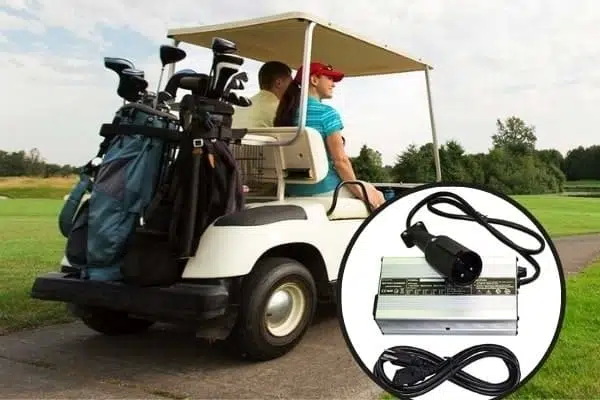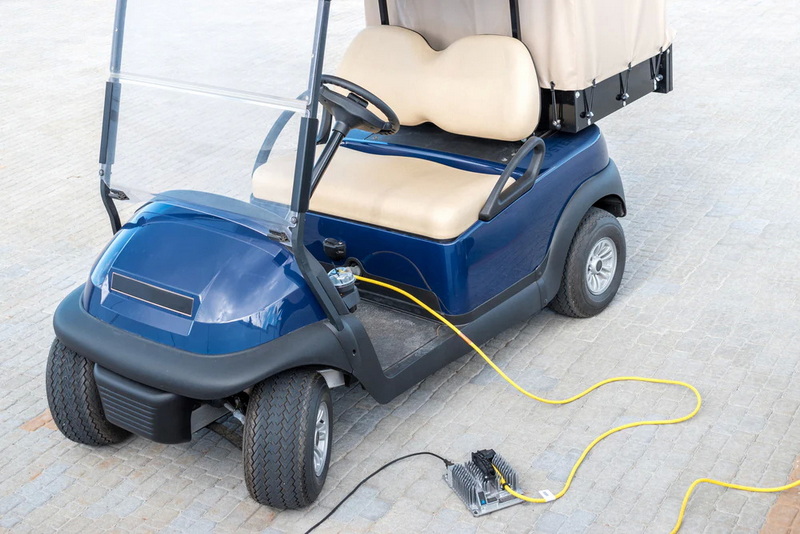Content Menu
● Understanding Electric Golf Cart Batteries
>> Lead-Acid Batteries
>> Lithium-Ion Batteries
● Charging Frequency Guidelines
>> Daily Use
>> Frequent Use (2-3 Times a Week)
>> Infrequent Use
● Factors Influencing Charging Frequency
>> Usage Patterns
>> Battery Type
>> Environmental Conditions
>> Terrain
● Signs Your Golf Cart Needs Charging
>> Reduced Speed
>> Dim Lights
>> Battery Level Indicator
● Proper Charging Techniques
>> Use the Correct Charger
>> Charge in a Well-Ventilated Area
>> Allow for Complete Charging Cycles
>> Avoid Interrupting the Charging Process
● Maintaining Your Golf Cart Batteries
>> Regular Cleaning
>> Water Level Check (for Lead-Acid Batteries)
>> Equalization Charging
>> Temperature Considerations
● The Impact of Charging Habits on Battery Life
>> Avoid Deep Discharges
>> Charge After Each Use
>> Don't Overcharge
>> Seasonal Considerations
● Charging Time for Electric Golf Carts
>> Battery Type
>> Charger Output
>> Depth of Discharge
● The Future of Electric Golf Cart Charging
>> Solar Charging
>> Fast Charging Technology
>> Smart Charging Systems
● Conclusion
● FAQ
>> 1. How long does it take to fully charge an electric golf cart?
>> 2. Can I overcharge my golf cart batteries?
>> 3. Should I charge my golf cart after every use, even if it's just a short trip?
>> 4. How can I tell if my golf cart batteries need to be replaced?
>> 5. Is it safe to charge my golf cart overnight?
Electric golf carts have become increasingly popular for their eco-friendly nature and low maintenance requirements. However, one of the most crucial aspects of owning an electric golf cart is understanding how often to charge it. This comprehensive guide will explore the best practices for charging electric golf carts, factors that influence charging frequency, and tips for maintaining battery health.

Understanding Electric Golf Cart Batteries
Before diving into charging frequency, it's essential to understand the types of batteries used in electric golf carts. The two most common types are lead-acid batteries and lithium-ion batteries.
Lead-Acid Batteries
Lead-acid batteries are the traditional choice for electric golf carts. They are less expensive but require more maintenance and have a shorter lifespan compared to lithium batteries. These batteries typically need to be charged after each use to ensure they remain in good condition.
Lithium-Ion Batteries
Lithium-ion batteries are becoming increasingly popular in electric golf carts due to their longer lifespan, lighter weight, and higher energy density. They can handle deeper discharges and require less frequent charging compared to lead-acid batteries.
Charging Frequency Guidelines
The frequency of charging your electric golf cart depends on various factors, including usage patterns, battery type, and environmental conditions. Here are some general guidelines:
Daily Use
If you use your golf cart daily, it's best to charge it after each use. This practice helps maintain the battery's health and ensures that your cart is always ready for use. Plug in your cart overnight, allowing it to charge for 8 to 10 hours with the proper style of golf cart battery charger.
Frequent Use (2-3 Times a Week)
For those who use their golf carts frequently but not daily, consider charging it every two to three days. This approach helps maintain battery health while preventing overcharging, which can be detrimental to battery life.
Infrequent Use
For those who use their golf carts infrequently, it's still essential to charge the batteries every 45 to 60 days. This practice helps prevent the batteries from discharging too much, which can lead to irreversible damage.
Factors Influencing Charging Frequency
Several factors can influence how often you should charge your electric golf cart:
Usage Patterns
The more you use your golf cart, the more often you will need to charge it. If you frequently take long trips or use the cart for extended periods, you may need to charge it more often than someone who uses it for short trips.
Battery Type
As mentioned earlier, the type of battery in your golf cart plays a significant role in determining charging frequency. Lithium-ion batteries can handle deeper discharges and can be charged less frequently than lead-acid batteries.
Environmental Conditions
Temperature and humidity can affect battery performance and charging needs. In extreme temperatures (hot or cold), batteries may discharge more quickly, requiring more frequent charging.
Terrain
If you frequently use your golf cart on hilly terrain or carry heavy loads, your batteries may drain faster, necessitating more frequent charging.

Signs Your Golf Cart Needs Charging
Understanding the signs that your golf cart needs charging can help you avoid being stranded. Here are some common indicators:
Reduced Speed
If you notice that your golf cart is not reaching its usual speed, it may be time to charge the batteries. Reduced speed can be a sign that the batteries are running low.
Dim Lights
If the lights on your golf cart appear dim or flickering, it's a clear indication that the batteries need charging.
Battery Level Indicator
Many modern golf carts come equipped with battery level indicators. If the indicator shows a low charge, it's time to plug in the charger.
Proper Charging Techniques
To ensure the longevity and optimal performance of your golf cart batteries, follow these charging techniques:
Use the Correct Charger
Always use a charger that is specifically designed for your golf cart's battery type and voltage. Using an incompatible charger can damage your batteries or lead to inefficient charging.
Charge in a Well-Ventilated Area
Batteries release gases during charging, so it's important to charge your golf cart in a well-ventilated area to prevent the buildup of potentially harmful fumes.
Allow for Complete Charging Cycles
Let your charger complete its full cycle, even if you only used the cart for a short time. Most modern chargers have automatic shut-off features to prevent overcharging.
Avoid Interrupting the Charging Process
Once you start charging your golf cart, try to avoid interrupting the process. Frequent interruptions can reduce the efficiency of the charging cycle and potentially shorten battery life.
Maintaining Your Golf Cart Batteries
Proper maintenance can significantly extend the life of your golf cart batteries and improve their performance. Here are some essential maintenance tips:
Regular Cleaning
Keep the batteries clean and free from dirt, debris, and corrosion. Use a mixture of baking soda and water to clean the battery terminals and connections.
Water Level Check (for Lead-Acid Batteries)
For lead-acid batteries, regularly check the water levels and top up with distilled water when necessary. Never let the plates become exposed to air.
Equalization Charging
For lead-acid batteries, perform equalization charging every 30 to 60 charges. This process helps balance the charge across all cells and can prevent sulfation.
Temperature Considerations
Extreme temperatures can affect battery performance. In very hot or cold conditions, consider storing your golf cart in a temperature-controlled environment when not in use.
The Impact of Charging Habits on Battery Life
Your charging habits can significantly impact the lifespan of your golf cart batteries. Here are some best practices to maximize battery life:
Avoid Deep Discharges
Try not to let your batteries discharge below 50% capacity. Deep discharges can shorten battery life and reduce overall performance.
Charge After Each Use
Even if you've only used your golf cart for a short time, it's best to charge it after each use. This practice helps maintain the battery's health and prevents sulfation in lead-acid batteries.
Don't Overcharge
While it's important to fully charge your batteries, avoid leaving them on the charger for extended periods after they're fully charged. Most modern chargers have automatic shut-off features, but it's still a good practice to unplug once charging is complete.
Seasonal Considerations
If you live in an area with seasonal weather changes, your charging habits may need to adjust accordingly. In colder months, batteries may require more frequent charging, while in warmer months, they may hold their charge longer.

Charging Time for Electric Golf Carts
The time it takes to fully charge an electric golf cart can vary based on several factors:
Battery Type
Lead-acid batteries typically take longer to charge than lithium-ion batteries. On average, lead-acid batteries may take 8-10 hours for a full charge, while lithium-ion batteries might only take 2-4 hours.
Charger Output
The amperage output of your charger affects charging time. Higher amperage chargers can charge batteries more quickly, but it's important to use a charger that's compatible with your battery type.
Depth of Discharge
The more depleted your batteries are, the longer they will take to charge fully. This is why it's generally recommended to charge after each use rather than waiting until the batteries are completely drained.
The Future of Electric Golf Cart Charging
As technology advances, we're seeing exciting developments in electric golf cart charging:
Solar Charging
Some golf courses and communities are implementing solar charging stations for golf carts, providing a sustainable and convenient charging solution.
Fast Charging Technology
Advancements in battery and charger technology are leading to faster charging times, potentially reducing downtime for golf cart users.
Smart Charging Systems
New smart charging systems can optimize the charging process based on factors like battery condition, temperature, and usage patterns, potentially extending battery life and improving efficiency.
Conclusion
Understanding how often to charge your electric golf cart is crucial for maintaining its performance and extending the life of its batteries. While the general rule is to charge after each use, factors such as battery type, usage patterns, and environmental conditions can influence the optimal charging frequency.
By following proper charging techniques, performing regular maintenance, and being aware of signs that your cart needs charging, you can ensure that your electric golf cart remains a reliable and efficient mode of transportation on the golf course or in your community.
Remember, the key to maximizing your golf cart's battery life is consistent and proper charging habits. With the right care and attention, your electric golf cart can provide years of dependable service, allowing you to focus on enjoying your ride rather than worrying about battery life.

FAQ
1. How long does it take to fully charge an electric golf cart?
Charging time can vary depending on the battery type and charger output. On average, lead-acid batteries may take 8-10 hours for a full charge, while lithium-ion batteries might only take 2-4 hours. Always refer to your specific golf cart's manual for the most accurate charging time estimates.
2. Can I overcharge my golf cart batteries?
Most modern golf cart chargers have automatic shut-off features to prevent overcharging. However, it's still a good practice to unplug the charger once the batteries are fully charged. Prolonged overcharging can potentially damage the batteries and reduce their lifespan.
3. Should I charge my golf cart after every use, even if it's just a short trip?
Yes, it's generally recommended to charge your golf cart after each use, regardless of the duration. This practice helps maintain the battery's health and prevents sulfation in lead-acid batteries. It also ensures that your cart is always ready for use when you need it.
4. How can I tell if my golf cart batteries need to be replaced?
Signs that your golf cart batteries may need replacement include reduced range, slower acceleration, difficulty holding a charge, and visible damage or corrosion. If your batteries are more than 5-7 years old and showing these signs, it might be time for a replacement.
5. Is it safe to charge my golf cart overnight?
Yes, it's generally safe to charge your golf cart overnight, especially if you have a modern charger with an automatic shut-off feature. However, ensure that your charging area is well-ventilated and free from potential fire hazards. Always follow the manufacturer's guidelines for safe charging practices.





















































